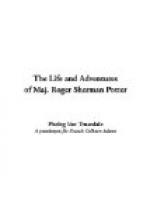When my father found that I was, in spite of the admonitions of the parson, resolved on setting out, and that he was confronted by the strong opposition of my mother, he gave up in despair, telling me whatever befell me, not to look to him for succor. My mother, on the other hand, gave herself up to my preparation for the journey with so much ardor, that she for several days almost wholly neglected the regulation of her domestic affairs. My precious new suit of black, in which I had adorned myself on Sundays, and, not a little vain of my appearance, shone out at church, was got out and brushed, and then nicely packed away in my valise, which likewise contained an ample supply of unmentionables, and homemade shirts, and stockings, and other articles appertaining to the wardrobe of an adventurous young man. My mother also exercised a wise discretion in the selection of such books as she thought would afford me “maxims of guidance,” as she called it, through the world. A pocket Bible, and a small volume of the “Select Edition of Franklin’s Maxims,” a book in high favor with the good people of the Cape, were got of a bookseller in Barnstable, a queer wag, who had got rich by vending a strange quality of literature and taking fish in exchange. In addition to these good books provided by my mother, I was careful not to forget my “Polite Speech Maker,” a book which I confess to have studied much. In truth, like many distinguished members of Congress, I am indebted to it for my great political popularity. Resolved as I am that this history shall never swerve from the truth, I would sincerely recommend a study of the “Polite Speech Maker” to all juvenile politicians, dealers in liquor, editors of three-cent newspapers, and learned litterateurs, whose names, according to sundry malicious writers, it is come the fashion of the day to reflect in one mirror.
In the “Polite Speech Maker” will be found such sentences as “the tranquilized glory of our glorious country,” and “the undying beauties, that starry emblem, our flag, awakens in our heart of hearts;” and sundry others, equally abstruse, but no less essential to the objects of primary meetings. The author of this invaluable work is my learned friend and very erudite scholar, Dr. Easley. And as some readers hold the study of an author of much more importance than his book, I may be excused for saying here that no one can take up one and forget the other, since literature, as is there set forth, was never before either blessed or encumbered with so great a doctor.
My library and outfit being complete, my mother, having provided me with a yellow waistcoat and white plush hat out of her private purse, gave an evening party in honor of my departure. Parson Stebbins, the doctor of a neighboring village, (not Easley, for he had set up his fortunes in New York,) and sundry bright-eyed damsels of my acquaintance, were invited, and came accompanied by their sturdy parents. The last




